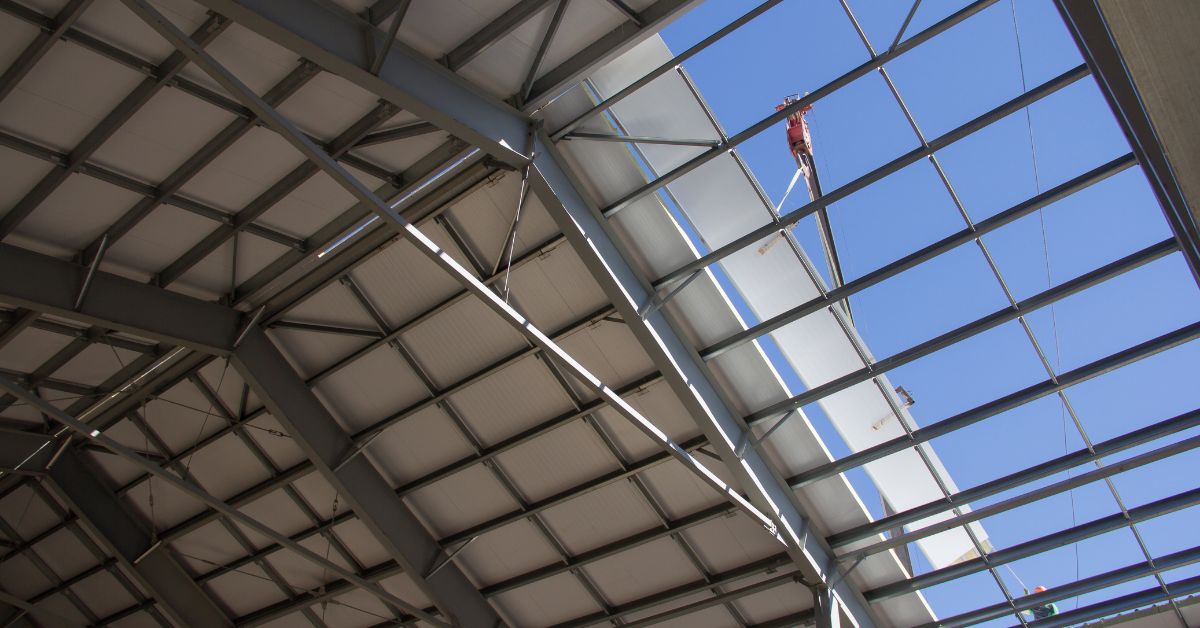The flat roofing solution has become very popular among investors and residential users over the past decade.
Resistant to weathering, they allow the building volume of the top floor to be utilised more rationally and achieve a contemporary and versatile building appearance.
If designed correctly, they can also be an advantage from a sustainability point of view.
In addition, buildings with large roofing areas need effective weather protection and high insulation performance in order to rationalise energy performance.
Roofs covered with sandwich panels can combine efficiency and aesthetics in this respect.
Solutions for flat roofs
There are two types of flat roofs:
- Warm roof: where the waterproofing layer protects the outside of the roof from external weather factors
- Inverted roof: where the waterproofing layer is concealed under a strong, non-absorbent layer of thermal insulation to protect against premature deterioration.
Of the two types, the inverted roof configuration is preferable because the sheathing is protected from climatic and mechanical aggression by the insulation panel and only has to perform its waterproofing task.
For this reason, when choosing the design of a flat roof, opting for a dry-laid roof may be the best solution to guarantee control of each construction element, combining:
- installation speed;
- insulation;
- impermeability and resistance to UV rays.
In the inverted roof configuration, the insulation must have very good water and compressive strength characteristics, because it is the layer most exposed to the weather.
In order to provide optimum performance on site, Isopan has designed the Isodeck PVSteel panel: consisting of an outer sheet pre-coupled with a PVC or TPO membrane and an inner sheet shaped with a corrugated profile. Isodeck PVSteel guarantees a 100% waterproof cover and is also one of the building blocks of the GreenROOF solution.
Sandwich panels for green roofs
The flat roof, in its green roof or 'green roof' form, is an interesting alternative to the traditional roof, as it allows excess water to be temporarily stored by means of a special drainage and water storage layer, without immediately dispersing it into the urban sewers, which are often subject to overflowing and thus flooding. In addition, the green layer is an excellent thermal insulation that provides comfort to the living space below.
The stratigraphy of the green roof consists of the following layers:
- Root-proof waterproof membrane
- Protective layer of the waterproof covering
- Drainage layer
- Water storage layer
- Filter fabric
- Growth medium
- Vegetation
Roof gardens are mainly applied in:
- Private residential terraces
- Apartment building roofs
- Roofs of multi-storey car parks or underground car parks
- Schools and public buildings
- Private garages
There are two types of green roofs depending on the size and use of the garden:
- intensive green: approx. 25 cm thick, possibility to grow plants and vegetables;
- extensive green: thinner, about 15-25 cm composed of a SEDUM cladding and requires little maintenance, mainly used for large areas.
The correct design of the green roof and its stratigraphy, the calculation of the flow rates and the choice of the correct vegetation, play a fundamental role in the success of the objective of ensuring the maximum thermal performance of the structure.
This is why relying on Isopan-Daku's GreenROOF solution is a safe and proven design choice.
Manni Group has developed two green roof solutions, both based on the PVSteel sandwich panel, which feature an already integrated slab-insulation construction package.
- GreenROOF Extensive: suitable for large surfaces, has a low substrate thickness (3 - 15 cm) with a maximum weight of 100 kg/sqm. The vegetation, consisting mainly of sedum, grasses and succulents, is hardy and does not require constant maintenance. This type of roofing is not walk-on. Thanks to the system's high water storage capacity, the vegetation remains in optimal condition even during long dry periods. The water is returned to the vegetation by means of a capillary rising system.
- GreenROOF Intensive: a solution suitable for small to medium areas.
It has a greater substrate thickness (15 to 30 cm) and an overburden weight between 120 and 350 kg/sqm. It enables to grow taller plants with deeper roots such as grass, lawns and bushes. Regular maintenance and watering are necessary. It can be used similarly to traditional gardens, so it is possible to sow and cultivate. Careful design of the loads is crucial for the correct dimensioning of the structure.
The salient advantages of GreenROOF roofing solutions are:
- Water retention;
- Ability to retain particulates;
- Roofing protection;
- Thermal insulation and climatic comfort;
- Soundproofing;
- Improved bio-climate and environmental impact;
- Enhancement of building surfaces.
Achieving excellent insulation with sandwich panels on pitched roofs
In residential, commercial and industrial buildings, the aim is to combine speed of installation for large dimensions, excellent thermal performance and versatility of design solutions in urban contexts. In the latter, in fact, it may often be necessary to adjust to the heights of existing eaves and therefore to opt for solutions with inclined pitches.
Landscaped contexts or historic centres require the preservation of existing skylines and tectonic and aesthetic features.
Isodomus sandwich panels can be used for the roofing of new buildings or for renovations, and the shape that replicates the roof tile (Isodomus) and the tile (Isodomus Classic) gives the panel an aesthetic value that is suitable for both rural and civil contexts.
New in the Isodomus panel range is Isodomus Superior: even higher performance through an increase in the total volume of the insulating core, a redesigned profile for greater thickness uniformity to achieve both improved thermal performance and reduced condensation.
In the industrial, commercial, agricultural and livestock sectors, Isocop sandwich panels are an ideal solution in terms of load-bearing capacity and ease of installation for large areas requiring versatility of use.
Insulated panels can be applied on top of any roof structure. They consist of a layer of polyurethane foam, a material with low weight and excellent performance.
Isopan polyurethane is anhygroscopic, impermeable to water as it consists of 95% closed cells.
The layer in contact with the outside consists of a waterproof metal foil that reproduces the appearance of roof tiles or tiles in various colours. Polyurethane and foil are resistant to chemical and biological agents such as mould and fungi.
The advantages of Isodomus insulating shingles and Isocop panels can be summarised as follows:
- Lightness of the material and ease of installation with a view to rationalising construction time;
- Excellent thermal and acoustic insulation capabilities;
- Possibility of creating large continuous roofs compared to traditional roof tiles or roofing tiles with the advantage of reducing overlaps that could make the surface more prone to infiltration;
- Mechanical resistance and dimensional stability: withstands operating temperatures between -40° C and +80° C.
For each type of roofing application Isopan offers a tailor-made solution, designed with specific, state-of-the-art technologies and materials.
The range of solutions includes Isodeck PVSteel specifically for flat roofs, Isopan-Daku's GreenROOF designed for green roofs, the Isodomus range specifically for sloping roofs in urban or rural contexts where aesthetics must dialogue with the context, and Isocop for roofs in industrial and commercial settings.


